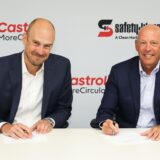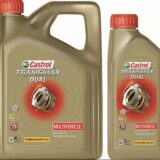
Castrol partners with Pulpex to reduce plastic packaging use
Castrol, part of the bp group and one of the leading global lubricant brands, announced a new packaging partnership with Pulpex. Successful adoption of Pulpex technology could substantially reduce Castrol’s plastics use.
Pulpex is a first-of-its-kind technology that forms bottles from wood pulp using 100% renewable feedstocks from responsibly managed forests. Its paper bottle offers a lower carbon footprint – up to 30% less than PET and glass.
Castrol is the latest company to join the Pulpex partner consortium – a group of leading global consumer packaged goods (CPG) companies committed to adopting Pulpex paper packaging. Launched in July 2020 as a collaboration between Pilot Lite and Diageo, the consortium includes PepsiCo, Unilever and GSK Consumer Healthcare with other brands poised to follow suit.
Pulpex is a collaboration between Pilot Lite and Diageo. Pilot Lite is a pioneer and international leader in venture management with a successful track record helping Fortune 500/FTSE 100 corporates accelerate the commercialization of innovation. Through its Pilot Lite Capital arm, Pilot Lite directly invests in and converts corporate IP into free-standing, revenue-generating businesses. Diageo is a global leader in beverage alcohol with an outstanding collection of brands sold in more than 180 countries around the world. The company is listed on both the London Stock Exchange (DGE) and the New York Stock Exchange (DEO).
Last month Castrol launched its PATH360 strategy, which aims to deliver a more sustainable future by saving waste, reducing carbon and improving lives.
One of Castrol’s aims is to halve its plastic footprint by 2030, and this partnership forms part of its plastic footprint reduction plan.
Castrol is already incorporating recycled plastic into its packs in the U.S. and is rolling out a new optimised pack design that uses less plastic and packs better for more efficient logistics. Exploring the use of alternative materials is the next step in the company’s plastic reduction journey.
“Castrol is committed to examining the lifecycle of its existing and new products to see how they can be improved, extended, reused or recycled,” said A.S. Ramchander, Castrol’s chief marketing officer. “We’re very excited to be working with Pulpex to explore how their technology, initially designed for the FMCG category, can be developed for lubricants as a replacement for our existing high-density polyethylene (HDPE) bottles.”
“Our initial work in adapting the Pulpex 100% PET-free bottle technology for use in oil packaging has been extremely positive. Collaborating with innovation partners such as Pulpex is critical to developing novel solutions in this challenging category and we are delighted to be working with them to achieve our sustainability ambition,” Ramchander said.
“Our research has shown that our customers and consumers are looking for more sustainable solutions. This technology, if successfully scaled, could help towards reducing Castrol’s plastic footprint,” he added.





.png)







